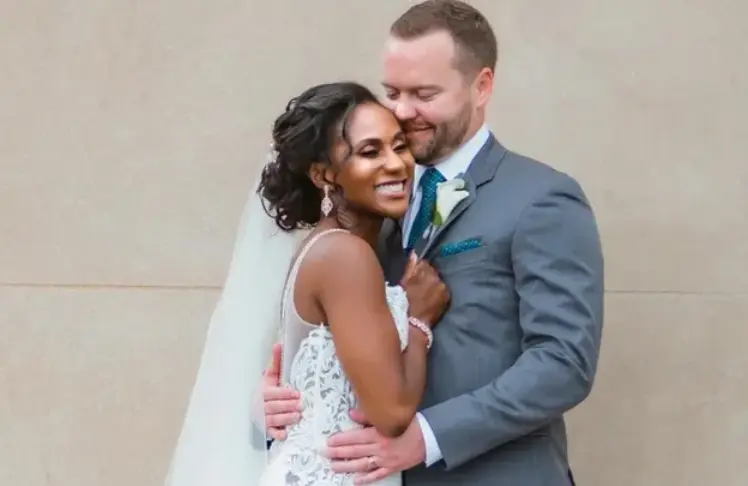
Krystal Anderson seemed to move easily between two worlds as an NFL cheerleader and a college-educated computer scientist. For nearly a decade, she split her time cheering and dancing for the Kansas City Chiefs and her career job as a software engineer for a medical tech company.
Her passion for cheerleading and dance, friends say, was exceeded only by Anderson’s desire to help solve the riddle of disproportionately high rates of Black women who die during childbirth. Indeed, she won a patent for software that can assess a woman’s risk of postpartum hemorrhage.
Tragically, however, Anderson — a married, expectant mom herself — fell victim to the very problem she tried to solve. She died of sepsis on March 20, shortly after doctors delivered her stillborn daughter.
“Krissy sought out hospitalization during her 21st week of pregnancy,” according to a GoFundMe page set up by her friends to cover medical and funeral expenses and to set up a “legacy fund” in her honor. “Despite the trauma of losing her baby girl, Charlotte, during childbirth, she fought on.”
Anderson’s death at age 40 is the latest reminder that Black women are at the center of a global maternal health crisis — one that impacts even middle-class Black women like her.
The numbers from researchers conducting studies have never been good and are getting worse. But there is a question of how much worse.
Questionable Data
Experts agree that the number of U.S. women who died within a year after pregnancy more than doubled between 1999 and 2019, with the highest deaths among Black women, according to a study by the Journal of the American Medical Association.
As of 2021, the National Vital Statistics System reported 32.9 maternal deaths per 100,000 births, which is the highest rate since 1964. A maternal death is the death of a woman while pregnant or within 42 days of termination of a pregnancy.
Earlier this month, however, the American Journal of Obstetrics & Gynecology published a study suggesting the national U.S. maternal mortality rate is actually 10.4 deaths per 100,000 births — much lower than what the NVSS and CDC report.
Black women are still three times more likely to die than white mothers, regardless of income, marital, or job status.
The AJOG study concluded that “The high and rising rates of maternal mortality in the United States are a consequence of changes in maternal mortality surveillance, with reliance on the pregnancy checkbox leading to an increase in misclassified maternal deaths.”
Questions about the data began showing up in 2003 when the national death certificate was updated to include a pregnancy checkbox to be checked by persons certifying a death. The CDC responded to research showing that maternal deaths were undercounted on death certificates and that states were using noncomparable methods and recommended that all states add a standardized checkbox to improve the identification of maternal deaths.
Legislative Action
Congress has taken notice of the maternal health crisis. Last year, members of both the House and Senate reintroduced the Black Maternal Health Momnibus Act, a bill intended to address the root causes of maternal mortality, morbidity, and maternal health disparities.
Sen. Cory Booker (D-N.J.) called the bill an important move toward a solution.
“No one deserves to be left behind by the health care system or face inadequate care during pregnancy, labor, and postpartum,” he said in a statement. “This legislation is a critical step towards saving lives, ending disparities in health care and outcomes, and ensuring our health care system treats all moms with the care and dignity they deserve regardless of their race or circumstance.”
The legislation would provide funding for critical investments in social determinants of health that influence maternal health outcomes, like housing, transportation, and nutrition. It also calls for growing and diversifying the perinatal workforce and investing in federal programs to address maternal and infant health risks during public health emergencies.
There’s Still Heightened Risk for Black Women
Anderson’s life and sudden death, however, illustrate what has frustrated some researchers and maternal health advocates alike: Black women are still three times more likely to die than white mothers, regardless of income, marital, or job status.
A 2005 graduate of the University of Richmond, Anderson began cheering for the Chiefs in 2007 and stayed with the squad until 2016, according to her LinkedIn profile. By the time she joined the team, however, she had already started her tech career, joining the Cerner Corporation just after graduation.
She spent 18 years at the company, working her way up from software engineer to manager, according to her profile. She joined Oracle Health in 2022.
She was loved and adored.
Her death came suddenly, according to the narrative written by friends on Anderson’s GoFundMe page. Just after her stillborn daughter was delivered, she developed sepsis, the body’s extreme response to an infection that can often cause death.
“Her fight with sepsis led to organ failure, and she was placed on life support,” according to the narrative. “Krissy underwent three surgeries, but the source of infection remained elusive.”
The Chiefs Cheer organization paid tribute to Anderson.
“We are deeply saddened by the recent passing of CC alum Krystal. Krissy cheered with us for over 100 games from 2006-2011 and 2013-2016,” the Chiefs Cheer organization said in a statement. “She was loved and adored by her teammates, fans, and strangers who were never strangers for long.”
Her husband, Clayton Anderson, told local TV station Fox 4 his wife had a personality and brilliant smile that “made every room just light up.” She made friends everywhere, volunteered for charity and was “an absolute force for good.”
Mourners her have filled his home, “but it feels empty,” Clayton Anderson said. “I feel lost.”















